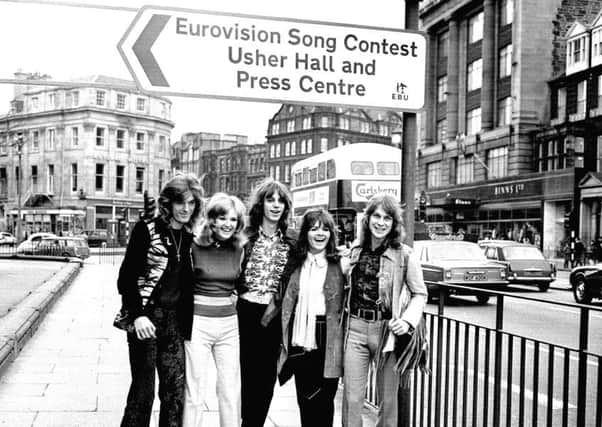Liam Rudden: Eurovision - A parody I love


It was a family occasion back in the day when, as kids, we’d all gather around the old black and white set and stay up late to see if the United Kingdom or indeed Ireland, could take on the rest of Europe and win.
In 1970, Dana did... for Ireland, and for weeks after the strains of All Kinds Of Everything reverberated around the tenement flat I grew up in, the single having being proudly purchased by my Irish mammy, keen to get her fellow country-woman to the No 1 spot.
Advertisement
Hide AdAdvertisement
Hide AdBack then, Katie Boyle was on hosting duties in a ballgown, a live black-tie orchestra provided the music and the Eurovision Song Contest was taken very seriously indeed.
Chart toppers regularly represented the UK; bare-footed Sandie Shaw sang Puppet on a String in 1967, Lulu belted out Boom Bang-A-Bang in 1969, and Cliff Richard appeared twice, scoring a second place with Congratulations in 1968, and coming third in 1973, with Power To All Our Friends.
That era - before the need for semi-finals - also saw the UK boast one of the best loved Eurovision winners ever, when in 1976 Brotherhood of Man won with Kisses For Me.
At the BBC’s 60th anniversary concert last year, they reformed, stopping the show at the Hammersmith Apollo. So long did their standing ovation last, it had to be edited for broadcast.
Advertisement
Hide AdAdvertisement
Hide AdEdinburgh too has played its part in the Eurovision story. When 1971 winners Monaco were unable to host the following year’s contest, The Usher Hall filled the void - the New Seekers singing Beg, Steal or Borrow represented the UK.
Terry Wogan first appeared on the scene around that time too, providing the TV commentary in 1973, again in 1978, and then every year from 1980 until 2008.
This week’s report that Björkman, speaking at a music conference, had claimed Terry’s gentle mockery of the entrants had “raised a generation of viewers believing this was a fun kitsch show that had no relevance whatsoever,” highlights perfectly the evolution of the contest over the decades.
The Eurovision Song Contest, rebranded simply as Eurovision is now just that, a ‘fun, kitsch show.’
Advertisement
Hide AdAdvertisement
Hide AdActually, it is more than that, it has become a camp-fest of the outrageous and, at times, the ridiculous.
Exactly what Bjorkman and his fellow producers have made it.
That Terry pointed this out as the competition changed over the years only endeared him to viewers. He said what everyone was thinking... that the show had become a parody of itself.
With singing grannies, bearded drag queens, performing puppets, and the threat, this year, of an exhibitionist singing nude with a wolf, Björkman could do well to look closer to home when considering who is really making a mockery of a contest born out of a desire to bring Europe closer together after the horrors of World War Two.
Advertisement
Hide AdAdvertisement
Hide AdThat said, I still love Eurovision. It is what it is. I’ll still be trying to pick the winner, usually manage to, despite the ‘political voting’, which, by the way, is nothing new either.
When Cliff was beaten into second place by Spain in 1968, it was claimed that vote rigging by state television on behalf of General Franco’s fascist regime was behind the six points Germany awarded Spain to put them one point ahead of Cliff.
Some things never change. Others do. That doesn’t make today’s contest any better or any worse than earlier ones, just different.
And in this day and age, surely any event which can bring the world together in fun and song has to be a good thing. Doesn’t it?